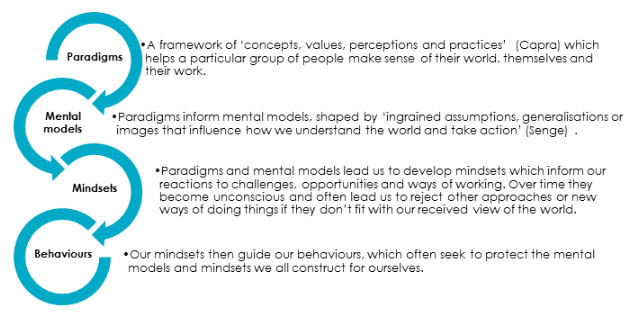Mindsets do not have to be fixed. We can develop our mastery of mindsets for partnership, starting with self-awareness, awareness of others and self-regulation. We first need to understand how we interpret the world and react to it, according to our own mental models. Understanding the paradigms and mental models which guide the way we see ourselves, others and our work will help to explore how we can develop our mindsets (see diagram 1).
Any level of organisation: a society, a profession, a company, or a partnership will have paradigms and mental models which influence the way we see things and do our work. Bring a commercial organisation, and NGO and/or another institution together and the different paradigms can lead to fundamental misunderstandings and miscommunication. Shifting mindsets requires us to challenge and reimagine the paradigm3 in our organisation or partnership to break and remake our mental models and inform new behaviours.
Reexamine mindsets
- Take a fresh look at the problem/s you’re looking to solve.
- How is it new/different from the problem/s you faced in the past? How has the context changed?
- ‘Out’ your current mindsets (what are your current assumptions?).
- Do your current mindsets enable or disable your ability to solve the problem?
Identify new assumptions
- Challenge old assumptions.
- Resist the temptation to adapt and refine, purposefully create new assumptions relating to the new context and problems you face.
- How does this change the relevance of your approach?
Establish a new framework of priorities and outcomes
- Redefine the issues you need to tackle.
- Drive out how your new priorities relate to your new assumptions ‘Because of this, we need to do this …’
- Starting from your new assumptions, define the outcomes you want to see (these may be the same as previous outcomes, but the route to achieving them will be dramatically different).
Develop behaviours to support a new set of assumptions and priorities
- Define behaviours which will enable you to successfully achieve your priorities.
- Lead with these behaviours to exemplify new ways of doing things.
Consider new methods and systems
- Consider new methods and tools; how can you socialise and systematise a new approach in your organisation or partnership?
Be prepared for dissonance and discomfort along the way. This is hard to do. Challenging your paradigm and reimagining your organisational or partnership mindsets, will ultimately lead to new ones, capable of spawning new approaches and creative ways of tackling the challenges ahead.
Diagram 1: How behaviours are a function of mindsets, mental models and paradigms.
- Capra, F. (1996). The web of life: A new scientific understanding of living systems. New York: Anchor Books.
- Senge, P. M. (1990). The fth discipline: The art & practice of the learning organization. New York: Doubleday
Follow the series to get an ‘overview of the mindsets for partnership and innovation’ and delve deep into each mindset for more insights and tools. Sign up at https://www.ethicore.com/get-in-touch/sign-up/ to receive the series by email.
By Jane Thurlow
[3] Daryl Conner; Conner partners, http://www.connerpartners.com/frameworks-and-processes/the-movement-begins.


